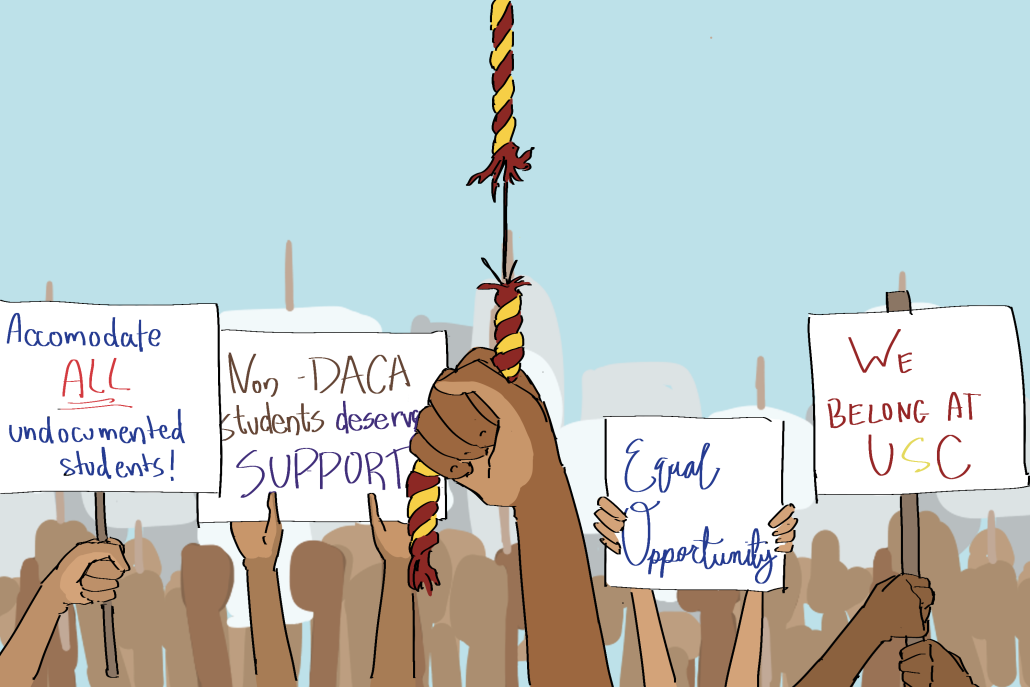UNDOCU-TALES
The undocumented experience at USC is often overlooked
The lack of expertise by the University fails to meet its inclusivity statements.
The lack of expertise by the University fails to meet its inclusivity statements.


The University has prided itself on diversity and how “You Belong at USC”, but behind that statement lies a community in the shadows.
As we’ve seen with the renovations of the Wilson Student Union and the expansion of diversity and inclusion initiatives, the demands of immigrants have become absent. When the conversations happen, it’s often students holding the mic — administrators rarely step forward to listen, learn and propose action. To be an undocumented immigrant is to live in the shadows, but these shadows grow deeper at USC. As a student leader, advocacy becomes a full-time job, yet each effort feels worthless — met with pauses, redirection and often silence.
Los Angeles is a city filled with immigrants. California as a whole is a state that has demonstrated support for undocumented students pursuing higher education. While the city and the state have created a precedent of support, the University remains stuck in 2012, when the Deferred Action of Childhood Arrivals was created.
While students with DACA, DACA-eligible and DACA-ineligible share the term “undocumented,” they have their differences. Students with DACA are legally able to work, travel and are protected from deportation. However, DACA-ineligible students risk deportation, don’t hold work permits and risk traveling. Given the current political climate, DACA has not been accepting new applicants since 2021. The University has yet to adjust their resources to accommodate all undocumented students, not just those under DACA.
The University’s financial aid website lists the requirements for those who are eligible for need-based aid. They must be “undocumented and meet California Dream Act requirements or have Deferred Action for Childhood Arrivals (DACA) status.” This requirement not only leaves out-of-state undocumented students, but additionally those without DACA.
If out-of-state undocumented students are admitted, how does the University support them if they do not qualify for need-based aid? The University is ultimately admitting students without having a plan to support them, creating emotional distress and humiliation as these students appeal over and over again.
The DACA-eligible generation of undocumented students is slowly phasing out, resulting in an increase of non-DACA undocumented students with no institutional support. As time progresses, we will see the number of non-DACA undocumented students surpass those with DACA.
At USC, there has yet to be a central resource webpage, center and institutional support for those who don’t hold DACA status. This creates an imbalance between programs that benefit DACA recipients and students who don’t have institutional support.
Upon arriving at USC, I came from a high school that held English learning programs, immigrant justice organizations and a Dream Center. Entering a private university, I expected a lack of knowledge of my community, but not the extent to which I have faced. The First Generation Plus Success Center states that it is open to undocumented students. However, it has demonstrated a lack of resources and expertise in supporting undocumented students.
On their website, one can find information regarding University cultural organizations and spaces, and one designated for undocumented students. While we appreciate the visibility the center has provided, there is still much work to be done. Information regarding scholarships, direct contacts and information for prospective students is not to be found. However, this isn’t FG+SC’s fault, it is a consequence of the University’s lack of appointment for administrators who will work directly for undocumented students.
Accepting a student to the University should not leave them with burdens to accept their admission. While the University’s admissions doesn’t bar undocumented students from applying and being admitted, the welcome seems to only extend as far as the acceptance letter. Diversity and inclusion should extend to all student groups. Additionally, when creating the resources, it should not just be available to those lucky to make the deadline of DACA’s last application cycle.
The reality of being a dreamer student on campus comes with encountering xenophobia. As for myself, I became barred from certain clubs, and upon tabling for the student group dedicated to fostering space for undocumented students, I was met with harassment — students filming me, telling me to go back to where I came from and crowded with students who believed I don’t belong at USC. There is no Dream Center for me to find my community and despite being in a sanctuary city, I felt unwelcome.
It is important for students to feel welcomed, but that must begin with the University administrators creating the conversations. It is my hope that one day their claims of “inclusivity” includes non-DACA students, and they bring resources for all undocumented Trojans as students have taken the lead.
Heydy Vasquez is a junior writing about the lack of support for undocumented students on college campuses. Her column, “Undocu-Tales,” runs every other Friday.
We are the only independent newspaper here at USC, run at every level by students. That means we aren’t tied down by any other interests but those of readers like you: the students, faculty, staff and South Central residents that together make up the USC community.
Independence is a double-edged sword: We have a unique lens into the University’s actions and policies, and can hold powerful figures accountable when others cannot. But that also means our budget is severely limited. We’re already spread thin as we compensate the writers, photographers, artists, designers and editors whose incredible work you see in our daily paper; as we work to revamp and expand our digital presence, we now have additional staff making podcasts, videos, webpages, our first ever magazine and social media content, who are at risk of being unable to receive the support they deserve.
We are therefore indebted to readers like you, who, by supporting us, help keep our paper daily (we are the only remaining college paper on the West Coast that prints every single weekday), independent, free and widely accessible.
Please consider supporting us. Even $1 goes a long way in supporting our work; if you are able, you can also support us with monthly, or even annual, donations. Thank you.
This site uses cookies. By continuing to browse the site, you are agreeing to our use of cookies.
Accept settingsDo Not AcceptWe may request cookies to be set on your device. We use cookies to let us know when you visit our websites, how you interact with us, to enrich your user experience, and to customize your relationship with our website.
Click on the different category headings to find out more. You can also change some of your preferences. Note that blocking some types of cookies may impact your experience on our websites and the services we are able to offer.
These cookies are strictly necessary to provide you with services available through our website and to use some of its features.
Because these cookies are strictly necessary to deliver the website, refusing them will have impact how our site functions. You always can block or delete cookies by changing your browser settings and force blocking all cookies on this website. But this will always prompt you to accept/refuse cookies when revisiting our site.
We fully respect if you want to refuse cookies but to avoid asking you again and again kindly allow us to store a cookie for that. You are free to opt out any time or opt in for other cookies to get a better experience. If you refuse cookies we will remove all set cookies in our domain.
We provide you with a list of stored cookies on your computer in our domain so you can check what we stored. Due to security reasons we are not able to show or modify cookies from other domains. You can check these in your browser security settings.
These cookies collect information that is used either in aggregate form to help us understand how our website is being used or how effective our marketing campaigns are, or to help us customize our website and application for you in order to enhance your experience.
If you do not want that we track your visit to our site you can disable tracking in your browser here:
We also use different external services like Google Webfonts, Google Maps, and external Video providers. Since these providers may collect personal data like your IP address we allow you to block them here. Please be aware that this might heavily reduce the functionality and appearance of our site. Changes will take effect once you reload the page.
Google Webfont Settings:
Google Map Settings:
Google reCaptcha Settings:
Vimeo and Youtube video embeds:
The following cookies are also needed - You can choose if you want to allow them:
